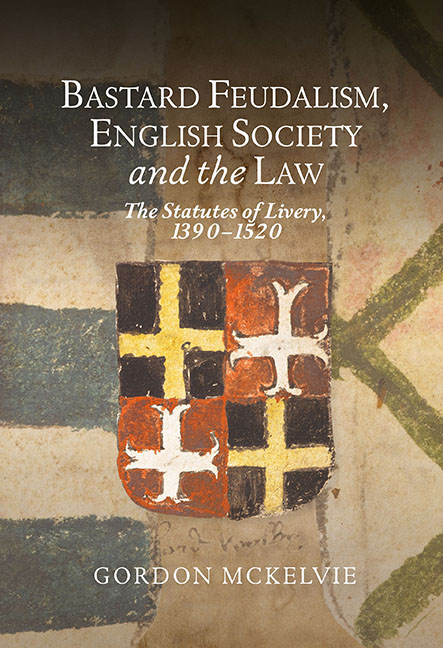Book contents
- Frontmatter
- Contents
- Acknowledgements
- Abbreviations
- Timeline of Parliamentary Activity
- Introduction
- Chapter 1 The System – Liveries and Retaining
- Chapter 2 The Early Years, 1390 to 1449
- Chapter 3 The Later Years, 1449 to 1520
- Chapter 4 Outcomes and Enforcement
- Chapter 5 The Identity of the Indicted
- Chapter 6 The Geography of the Cases
- Chapter 7 Networks and Localities
- Chapter 8 Livery and Disorder
- Chapter 9 The Urban Experience
- Conclusion
- Appendix 1 Number of Cases by Reign
- Appendix 2 Number of Cases in each County
- Appendix 3 List of Letters to Towns and Lordships
- Appendix 4 List of Local Ordinances
- Appendix 5 Letters from Henry VII to Duchy of Lancaster Officials
- Bibliography
- Index
Chapter 5 - The Identity of the Indicted
Published online by Cambridge University Press: 02 April 2020
- Frontmatter
- Contents
- Acknowledgements
- Abbreviations
- Timeline of Parliamentary Activity
- Introduction
- Chapter 1 The System – Liveries and Retaining
- Chapter 2 The Early Years, 1390 to 1449
- Chapter 3 The Later Years, 1449 to 1520
- Chapter 4 Outcomes and Enforcement
- Chapter 5 The Identity of the Indicted
- Chapter 6 The Geography of the Cases
- Chapter 7 Networks and Localities
- Chapter 8 Livery and Disorder
- Chapter 9 The Urban Experience
- Conclusion
- Appendix 1 Number of Cases by Reign
- Appendix 2 Number of Cases in each County
- Appendix 3 List of Letters to Towns and Lordships
- Appendix 4 List of Local Ordinances
- Appendix 5 Letters from Henry VII to Duchy of Lancaster Officials
- Bibliography
- Index
Summary
Although this book takes its core data from the records of the King's Bench, the potential of the material extends far beyond simply tracking levels of lawlessness and law enforcement. Legal records cannot be detached from the society that created them and therefore they are an indispensable source for understanding the structure of late medieval English society, which can be characterised as a ‘bastard feudal’ society. This book shares one of the professed aims of Andrew Spencer's recent study of earls during Edward I's reign, which was to ‘perform a little historical necromancy’ by reviving the use of the term bastard feudalism. Spencer noted that historians have used two definitions of bastard feudalism: a narrow definition in which bastard feudalism was the method by which nobles altered the way they obtained service by using grants of cash as opposed to the ‘feudal’ grant of land as rewards; and a broader definition in which the nobility dominated localities in a corrupt and intimidating manner. The focus of this chapter is the narrow definition that views bastard feudalism as primarily a method of obtaining service.
Studies of late medieval affinities have concentrated on the surviving private records, most notably indentures of retainer which K.B. McFarlane described as the ‘peculiar instrument of bastard feudalism’. The large corpus of surviving indentures of retainer from John of Gaunt in the late fourteenth century and William, Lord Hastings, during Edward IV's reign have enabled detailed studies of those particular affinities. Others have identified the composition aristocratic affinities from a range of private estate papers such as valors, deeds and wills in conjunction with references in the records of central government. Consequently, the topic has been approached from the perspective of those peers who retained men of local standing and prominence. Previous chapters have noted that the statutes permitted livery to be distributed by those below the level of the peerage, provided it was to family members, household servants, legal counsel and estate officials. There is, however, not the same richness in private estate records for the gentry compared to the peerage. This is in part an accident of survival and in part because the administrations of estates of the peerage were more sophisticated and on a larger scale. Consequently, these estates produced more documents and developed more sophisticated methods of record keeping.
- Type
- Chapter
- Information
- Bastard Feudalism, English Society and the LawThe Statutes of Livery, 1390–1520, pp. 106 - 130Publisher: Boydell & BrewerPrint publication year: 2020



